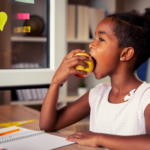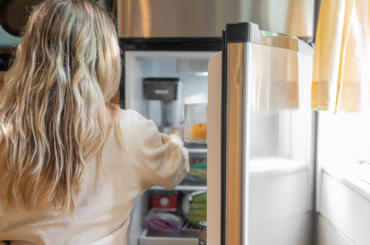Katy Stephenson, MD, MPH
As schools and daycares shut down, parents everywhere are asking whether playdates and shared care are OK.
ParentsTogether put that question to Dr. Katy Stephenson, a physician-scientist at Harvard Medical School and an infectious diseases specialist (and longtime friend of the ParentsTogether team)–she’s also a mom who’s struggling with these questions herself.
[UPDATE 3/15] Since I posted the first version of this article, there’s been a robust debate across social media as families struggle with the best ways to #FlattenTheCurve and slow the spread of the coronavirus. I’ve rewritten this to reinforce the idea that, in this public health emergency, all of us need to do whatever we can right now to reduce viral transmission in order to save lives.
Right now, the novel coronavirus is spreading exponentially in many of our cities and communities. The great danger is that our healthcare system will be overwhelmed by a rapid increase in critically ill patients. If there are many more sick people than we have equipment and healthcare workers to take care of, the death rate will increase dramatically. You can see this in the heartbreaking stories coming out of Italy right now.
One of the best tools to fight this is social distancing–making it harder for people with the virus to infect others by reducing the amount of close human contact across our whole community. If we slow the spread, fewer people will get sick, and crucially, fewer people will get sick all at once, which means fewer will die. This very cool simulation from the Washington Post article shows how social distancing can be effective.
So that’s the goal. Dramatically reduce contact, slow the spread, save lives.
The question is, how do we put this into practice for each of our families? Especially as schools close.
From a contagion perspective, the less contact, the better. But everyone’s situation is different. A household with a single parent working in a hospital and a toddler whose daycare is closed will need very different arrangements from a household with two parents working from home who can share childcare for school-aged kids.
So. Do what you can to stop unnecessary social contact. But only you know what’s necessary for your family.
I can’t tell you what to do — but I hope to give you more info to make the best decisions, as the situation evolves.
If you need to have contact with other families, here are some guidelines to keep in mind:
1. Avoid group events. This means no trampoline parks, laser tag, rock climbing gyms, bowling, birthday parties and that type of thing. Sorry!
2. If you need to interact with other families, keep it as small as possible. One kid is better than two. Two is better than four.
3. Be especially careful if anyone in your household is in a ‘high risk’ group. Older adults and people with serious illnesses have a higher likelihood of getting very sick from coronavirus and have to be protected.
4. Be especially careful if anyone is sick. This applies to your kid, the other kid, and whoever is in the home where the kids are hanging out. And sick means anyone who has a fever, cough, flu-like illness or mild respiratory symptoms like a cold.
5. Keep a very tight circle. Avoid mixing up different friend groups in ever expanding networks. This increases the likelihood of community transmission across different social circles. I’ve been telling friends to consider who would be in your ‘extended household’: another family you need to take care of your child so you can work; a neighbor with whom you are sharing care; your sister. Don’t have a rotating cast of play dates.
6. Don’t let kids have a lot of physical contact. If kids are together, avoid games where the kids wrestle or hug, and intervene when they fight. (But this is hard, especially for little ones, which is why avoiding groups wherever possible is key).
7. Don’t share utensils. Everybody gets a separate glass or bottle of water. Have one person serve food.
8. Go outside. It’s best to have the kids play in a well-ventilated area, so outside is perfect. If you’re in the city, try a big open field at the park. Outside of the city, take the kids for a hike.
9. But avoid playgrounds. Evidence suggests Coronavirus can survive on surfaces for hours to days on a variety of surfaces, so, unfortunately, it’s best to avoid playgrounds and play equipment. (And crowded playgrounds are also places where kids have contact with each other). The CDC has great guidance on how to keep your household and other surfaces clean.
10. Keep up with good hygiene. Make sure the kids do frequent hand washing or use hand sanitizer. If anyone is coughing or blowing their nose, they should go home.
I’m an infectious diseases doctor and I’ve based the above advice on recommendations from the Centers for Disease Control and other experts in the field (see NY Times article here).
Every community is different, and every day brings new lessons with this pandemic. All of this may change. Please ALWAYS go to your local department of health for the most current guidance on social distancing in your community.
My goal here is to help people make rational choices in their daily lives in the context of today’s real-life situation – as I write this, our schools are closed, but our local governments are still keeping public transit, grocery stores and coffee shops open.
My advice above applies to this moment of flux, as we find our way with how extreme social distancing is going to be. I appreciate my colleague’s posts advocating for extreme social distancing and 100% agree with the seriousness and alarm behind them. If local recommendations change and we are directed to shelter in place — some of these guidelines may no longer apply.
Right now the ParentsTogether team is focused on creating resources to support families through the crisis (when we’re not juggling childcare ourselves).
Join Coronavirus Parents: Parenting In A Pandemic, our new Facebook Group where parents are sharing ideas, strategies, activities, resources, stories, and support to make the best of a challenging situation.







